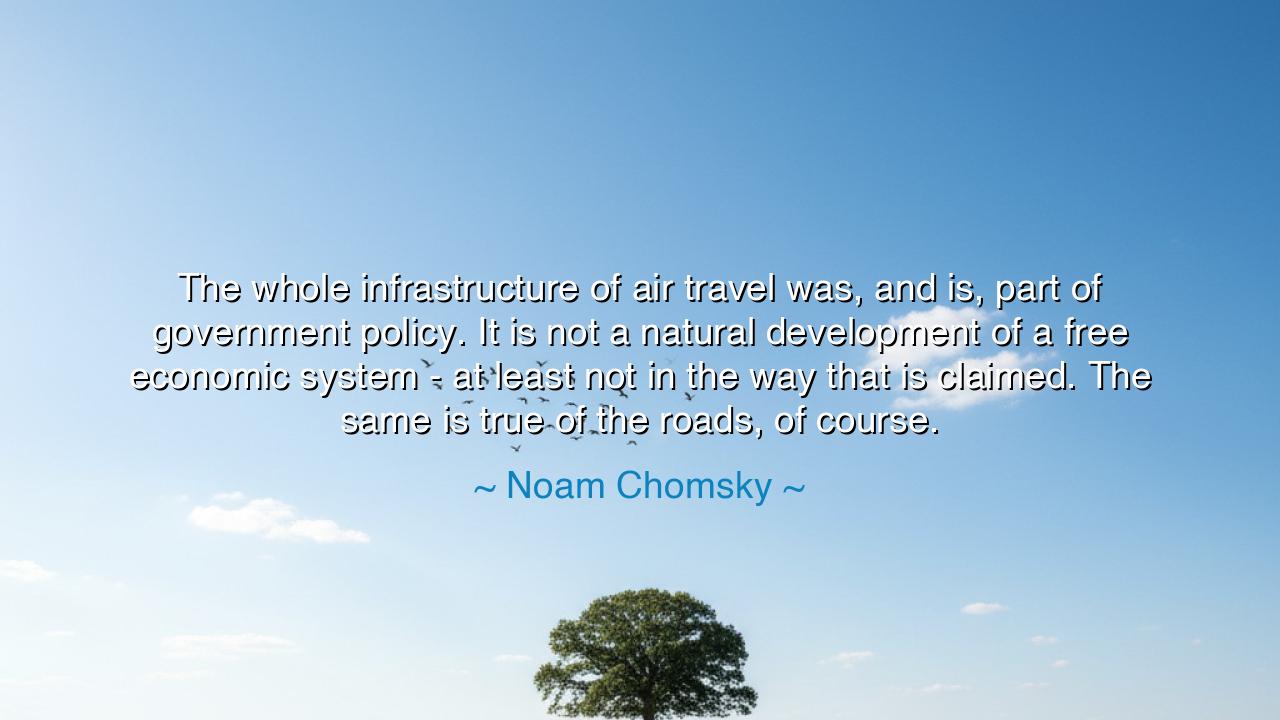
The whole infrastructure of air travel was, and is, part of
The whole infrastructure of air travel was, and is, part of government policy. It is not a natural development of a free economic system - at least not in the way that is claimed. The same is true of the roads, of course.






In a voice both fierce and contemplative, Noam Chomsky, the philosopher and critic of power, once declared: “The whole infrastructure of air travel was, and is, part of government policy. It is not a natural development of a free economic system – at least not in the way that is claimed. The same is true of the roads, of course.” In these words lies not only a critique of illusion, but a revelation of truth—that what we call “freedom of enterprise” often stands upon the unseen foundation of public investment, collective labor, and government planning. Chomsky’s insight pierces the veil of ideology to reveal the ancient truth that civilization itself, though built by individuals, survives only through the shared hand of the community.
To understand his meaning, one must look beyond the steel and the sky. The great network of air travel, the highways that thread through nations, the ports and power lines that sustain modern life—these did not arise by the spontaneous breath of the market. They were shaped by the deliberate hand of policy, by the collective will of nations seeking progress. When Chomsky says that air travel “was, and is, part of government policy,” he reminds us that what many celebrate as the triumph of private enterprise is, in truth, the fruit of public endeavor—the result of generations who labored, taxed, and planned together so that commerce might flourish upon their foundation.
The ancients knew this principle well, though they called it by other names. In the republics of Greece and Rome, the building of roads, aqueducts, and harbors was seen not as profit, but as duty—the sacred responsibility of the state to its people. A merchant could not trade without the road; a farmer could not prosper without the aqueduct; a soldier could not defend without the bridge. These structures were more than stone—they were the lifelines of the commonwealth. And so too, in modern times, the airplane that crosses the clouds and the car that speeds along the highway do so upon the shoulders of public investment, invisible yet immense.
Chomsky’s words are a challenge to the mythology of the “free economic system.” He does not deny the ingenuity of entrepreneurs, nor the energy of innovation; rather, he reminds us that even genius requires a stage upon which to perform. The market is not a wilderness where self-interest alone creates progress—it is a garden whose soil is tilled by laws, policies, and shared infrastructure. To claim otherwise, Chomsky says, is to forget the very roots of prosperity, and to blind oneself to the truth that freedom and interdependence are not enemies, but companions. For without the foundation of roads, airports, and schools—each born of collective effort—the engines of industry would stand still, and the wings of commerce would never rise.
Consider the story of air travel itself. In the early twentieth century, the Wright brothers gave mankind wings, but it was governments that taught those wings to soar. Public funding for research, subsidies for airlines, regulation of routes, construction of airports—all were acts of policy, not chance. The very air traffic systems that keep millions safe were born not from competition, but from cooperation. Likewise, the interstate highways of America, championed under President Eisenhower, were not built by the invisible hand of the market, but by the deliberate will of the state—justified first as a public good, and later as a matter of national defense. Thus, when Chomsky speaks, he speaks not of theory but of history, reminding us that the world we inhabit was planned, built, and paid for by the collective strength of society.
Yet, his warning runs deeper. For when a people forget the public nature of their prosperity, they risk surrendering it to those who would privatize the common good. When citizens believe that markets alone sustain civilization, they become blind to the silent labor of teachers, engineers, and planners whose hands make progress possible. Chomsky’s words are not merely a critique of economics—they are a defense of truth against illusion, of collective memory against forgetfulness. The danger is not in enterprise, but in arrogance—the belief that wealth builds itself, and that society owes nothing to the shared structures that support it.
Therefore, my children of the modern age, remember this wisdom well: every road, every runway, every invention stands upon the shoulders of the many, not the few. The government, when guided by justice, is not a hindrance to liberty but its guarantor. To despise all policy is to bite the hand that built the bridge upon which you walk. Let gratitude temper ambition; let humility guide innovation. Seek progress not by denying the public good, but by honoring it—by ensuring that what has been built for all is not captured by the few.
Thus, heed the teaching of Noam Chomsky: the marvels of civilization are not born of solitude, but of solidarity. The free market may fuel progress, but it is the infrastructure of the people that gives it flight. Honor both the freedom of enterprise and the power of the common will, for only when they move together—each supporting the other—can humanity truly rise, as the plane rises from the earth, upheld by the invisible air that all together breathe.






AAdministratorAdministrator
Welcome, honored guests. Please leave a comment, we will respond soon